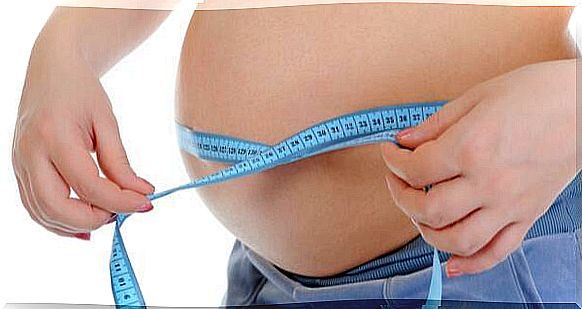Pregorexia: The Fear Of Gaining Weight During Pregnancy

When a woman is pregnant, she gains an average of 12 kilos. Although this is different for every woman, it is normal for the expectant mother to gain 2 kilos per month from the first trimester. However, some women develop pregorexia, anorexia during pregnancy.
Their weight loss, or lack of weight gain, and the resulting lack of nutrients, prevents the fetus from growing properly. Therefore, the consequences of pregorexia can be very serious, both for the mother and the unborn baby.
How do these moms avoid weight gain?
Pregorexia combines the words pregnant (pregnant in English) and anorexia. It is an eating disorder that affects pregnant women. These women develop an irrational fear of gaining weight during pregnancy. Women with pregorexia want to maintain their old weight at all costs. They are willing to do anything for that.
These women choose to restrict what they eat to very strict, low-calorie diets. They avoid carbohydrate-rich foods and fats, denying themselves all the cravings that are normal during pregnancy. They also use laxatives or vomit after eating. This is very dangerous!

Does this only happen in women who have had anorexia before?
It is possible for a pregnant woman to develop pregorexia despite having suffered from an eating disorder in the past. However, this is not the norm. It often arises if you have also suffered from an eating disorder, such as anorexia or bulimia. However, if you have already had an eating disorder, it does not mean that you will develop it again during pregnancy.
This disorder is caused by psychological, biological and interpersonal factors.
Symptoms of pregorexia
We can find that a woman can suffer from this disorder if she avoids talking about her pregnancy. Also, she will deny the problem, as well as the changes and her condition. This results in feelings of anxiety related to weight gain. She feels the problem will go away if she doesn’t talk about it.
Physically, it is noticeable that women who suffer from this disorder hardly gain weight during pregnancy. They may even lose weight. This is most noticeable during the second trimester, when we see the most physical changes.
In addition, a low-calorie diet, excessive exercise, and vomiting or use of laxatives can lead to dizziness or headaches, and excessive fatigue. She will also have problems concentrating and sleeping. These symptoms lead to risks during pregnancy, but can also lead to problems during delivery.
The consequences of pregorexia for the mother
The consequences of this disorder have on the one hand to do with the shortage of food. These include malnutrition, anemia, bradycardia, cardiac arrhythmias, hypertension, hair loss or very dry and cracked skin. It also has implications for pregnancy.
The decrease in essential minerals due to insufficient food intake can lead to osteoporosis, which can lead to low breast milk production. Once the baby is born, this makes it difficult for the mother to provide enough milk to feed the baby.
In addition, the woman’s amniotic fluid will have a low volume. This is the vital fluid for the fetus, which surrounds it and protects it from external injuries. This can cause the placenta to detach. If this happens, it can have very serious consequences, especially if it happens in the third trimester.

What effect does pregorexia have on the fetus?
The mother’s diet is critical to fetal development. The consequences of bad eating habits are very serious. Pregorexia increases the risk of complications during pregnancy.
For example, it can cause respiratory problems, underweight at birth and a low Apgar score in the fetus. However, it can also lead to the following problems:
- a premature birth, before the 37th week of pregnancy
- deformities
- brain problems
- ADHD
- intellectual disabilities
If the mother’s placenta is very severely displaced, this can lead to growth problems for the baby. Pregorexia also increases the chances of the baby dying during his first month, or stillbirth.
Comprehensive treatment
How you eat is just as important as how much you eat during pregnancy. If you don’t eat more food, you have to eat better. Pregnant women should pay attention to their diet, but not obsess over it.
The sooner pregorexia is detected, the better. If detected early, it is more likely that the consequences will not cause irreversible harm to mother and child.
Since pregorexia is a mental illness, it must be treated by a multidisciplinary and specialized team. A psychiatrist, an obstetrician, a dietician, a nutritionist and a nurse can together carry out a complex and extensive treatment.
It is best to create a relaxed and stress-free atmosphere during meals, but also to normalize an eating routine. A family should not force a pregnant woman to eat a certain amount of food. This can be very counterproductive.
Both obesity and extreme thinness cause high-risk pregnancies. Therefore, it is best to maintain a balanced and varied diet during this period. It is also a good idea to exercise regularly, such as yoga, Pilates or walking.
Appearance should never take priority when health is at stake. Especially not at the expense of a baby’s health!









